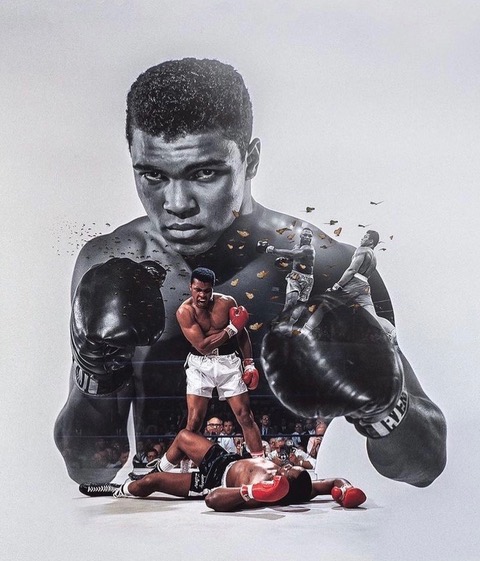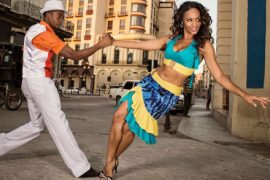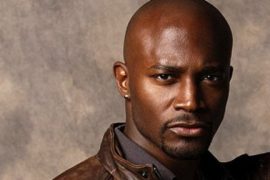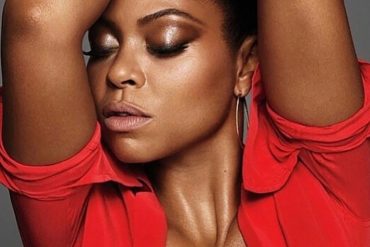Last week, I watched the four-part documentary on Muhammad Ali produced by Ken Burns. I was watching history that I had experienced in real-time, and I learned many lessons from Ali’s life. I was hesitant to watch the documentary because I thought his story would be “whitewashed” and perhaps twisted. It wasn’t. It was Ali’s story, and he would have approved.
As a student at Roosevelt University, I saw Ali in an exhibition fight at Navy Pier. He was amazing. I was not a boxing fan, but he pranced and danced with the beauty and grace of a ballerina. He was poetry in motion, quick, and he never stopped moving. I’ll never forget that day and wished that I could learn to box with Ali’s rhythm and, of course, achieve his leanness. Boxers have the best bodies, and Ali had not one ounce of fat.

Muhammad Ali is the world’s most acclaimed athlete and the only one ever to win the heavyweight boxing title three times. His historical fights were classic masterclasses. His “float like a butterfly sting like a bee” and his “rope a dope” strategies will be studied for years to come.
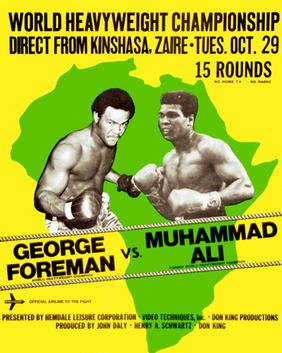 His battles with the likes of Joe Frazier, George Foreman, are legendary. Ali psyched his opponents in the way of signifying that it was both funny and sometimes cruel. Frazier never forgave Ali for his callous remarks about him. Ali started the fight long before getting into the ring, making noise and news, and selling tickets. He was a self-promoter, a marketer. In the early days of his career, he would call sportscasters and others in the news media to tell them about this man, Cassius Clay. He recognized his greatness, and he lived up to in and out of the ring ultimately.
His battles with the likes of Joe Frazier, George Foreman, are legendary. Ali psyched his opponents in the way of signifying that it was both funny and sometimes cruel. Frazier never forgave Ali for his callous remarks about him. Ali started the fight long before getting into the ring, making noise and news, and selling tickets. He was a self-promoter, a marketer. In the early days of his career, he would call sportscasters and others in the news media to tell them about this man, Cassius Clay. He recognized his greatness, and he lived up to in and out of the ring ultimately. Ali was a man’s man and redefined Black manhood. He fought for Black folk, calling his opponents “Uncle Toms.” He beat Foreman into saying his name was Muhammad Ali out loud.
During his quarrel with the government’s draft, he was not weak. He had character when he said he would not fight in the Vietnam War. He was solid and insistent for a simple reason. He said, “Ain’t no Vietnamese ever called me Nigger.” He said, my enemy is here in the United States, the white power structure, the racism in America. He confronted white racism in every way. He gave you the power to say you were great at something by your admission. He was unapologetic, and it unnerved most and was interpreted as arrogance. He scared the hell out of White America, and Black America loved it. It was the honest Ali. He was not afraid, and he was not going to live a “Jim Crow” life. His behavior was the perfect example of speaking truth to power.
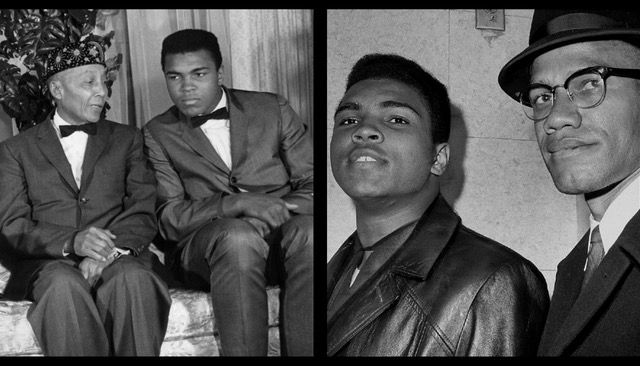
He changed his name from his birth name of Cassius Clay, Jr. to Muhammad Ali. His adopted name was assigned to him by his religious father, The Honorable Elijah Muhammad. The name means “beloved of Allah.”
He changed his lifestyle and his habits when he became a Muslim. Malcolm X befriended him and tutored him in the clean living and religious ways of the Muslims. From the teachings, he learned integrity. He was not phony; he engaged the principles into his life and became a changed man. As the years went on, he lost friendship with Malcolm because he chose to stay obedient to The Honorable Elijah Muhammad. Elijah departed from Malcolm after he made controversial remarks about President Kennedy’s assassination. He regretted dismissing Malcolm X from his life and didn’t even attend Malcolm’s funeral. On the day of the funeral, he had a boxing match.
Ali took mentoring very well. One of his behind-the-scenes mentors was Dick Gregory. Gregory taught Ali how to eat to strengthen his body. George O’Hare was also a mentor, paying close attention to Ali’s eating regiment and public relations. In addition, he was concerned with his image and began to travel with him to ensure that he remained focused.
Ali Running…
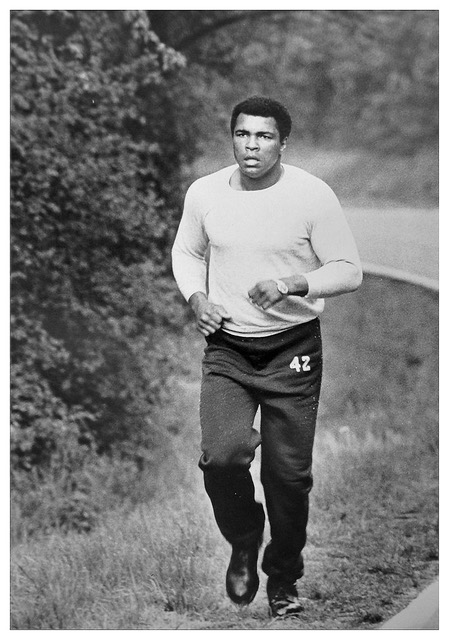
When I was teaching a very early morning class, every morning, I would often see a man in Washington Park wearing a hooded sweatsuit running and doing road work. I didn’t realize who it was and when I mentioned it to my dear friend, George O’Hare, he suggested that it was Ali.
I told George I wanted to run with him one morning. George told Ali, and he said I’ve noticed that car in the morning, watching me. So he invited me through George to join him.
I did one early morning. Ali was so graceful, and he ran backward beautifully as I have never seen. It was challenging, and I wanted to do that. I lasted for about 15 minutes. Ali asked me where I was going so early. I told him I was a professor and I was going to teach an early morning class. He asked could he go with me one day.
One day he joined me in the classroom. He was an unannounced surprise. I took him to class at Lindblom High School. He told my students very seriously how hard it was to be an athlete. He said to them that they should go to school to be professionals and not miss the opportunity to be educated. He told them to come home to work in their communities after graduation.
He said he was the “greatest,” but it came at a price. He told them athletes are seniors at 40 because of the toil that the brutal and strenuous workouts have on their bodies. A doctor can make his career last much longer, he proclaimed. He told the kids not to get caught up in popularity.
The students were spellbound as they listened to him in stone silence. Finally, at the end of his casual speech, he told them he really was the greatest. Before he left, he did a magic trick. Then, when we got in the car, he thanked me for being a teacher. He told me I would make kids bright and help them reach their footing in life. But then he said, you probably won’t be a teacher long.
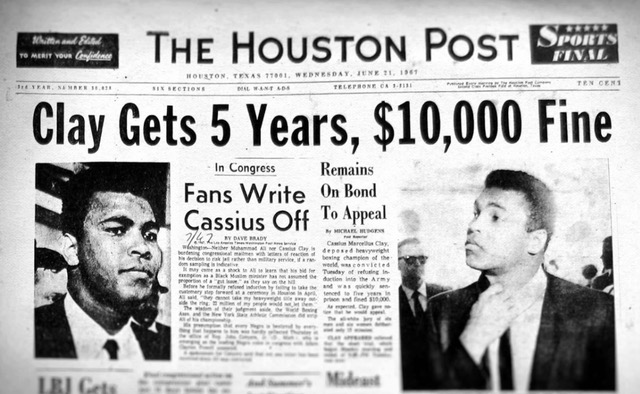
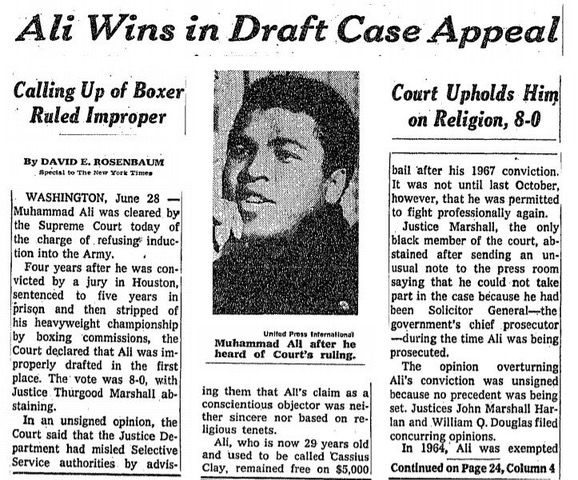
Ali stepped into his most significant moment when he refused to be drafted. In the end, he was proved correct. But he did say he would go to jail if need be and that he would even stand in front of a firing squad. He held his conviction. He said, “I am a boxer, not a killer.” Because of such a stance, he lost his license to fight. It was an extreme and cruel punishment. Nevertheless, he was a Black man, and he stood up to his government and white supremacy. He won in the end.
The N’DIGO Gala Honors Ali…
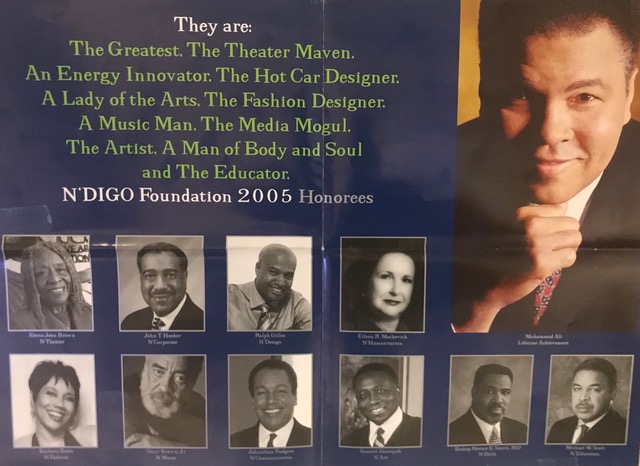
I wanted to honor Ali at the N’DIGO Foundation GALA. He was never “honored” in Chicago. He had traveled the world with tributes, honors, awards, and the like, but not in his adopted city of Chicago. I tried for four years to make it happen, but his schedule did not permit it. His friends, Cleve and Belevon Walker and Troy Radcliff, became my allies. Finally, I got Ali to join us in 2005 with a lifetime achievement award. His buddy was Cleve, and he came to the office every day two weeks before the Gala to work. I was stunned, shocked, and overwhelmed because he was serious. He said, “I want to help you with the gala.” Delores Elliott was the chair of the gala with a very efficient team, and she said, “let’s put him to work.” He wanted an assignment every day. He reported working at 11 a.m.
His first assignment was to have a luncheon and raise money, and he did. The next day he hosted a dinner and raised money. When he came to the office, he told us jokes and often performed magic tricks; the most famous was pulling money from behind your ear. Sometimes he brought lunch. I talked to his wife, Lonnie Ali, and she told me how to handle him with Parkinson’s and the medicine’s rules and effects. He was a joy.
One day he asked did I have boxing gloves. I said no, I don’t. He said I will get you boxing gloves and the next day brought back red boxing gloves to the office. Signing them, he said they would be valuable one day. He was right. During the gala, we auctioned the gloves, and they were invaluable. Cheryl Burton, an ABC-TV anchor, bought a pair, and someone from China also bought a pair. I cried every single day after he left the office. Due to his Parkinson’s disease, he was still poetry in motion but slower and very deliberate in his movement. His sense of humor was in tack, and he was still the jovial guy. He told me he was pretty. And he was.
One day he arrived at N’DIGO as we were putting out the paper. It was deadline day. I told him I was swamped that day because we had to produce a newspaper. He said, “so today, I will stay here with you and help put the paper out.” I started to cry, and I didn’t know what to tell him to do.
Steven Johnson, our graphic designer, told Ali to come to his area. We put Ali on a high chair and described to him as we printed the paper, he would be the one to sign off before we sent pages to the printer. He liked the idea. He sat on the stool and watched us work as the pages were in layout. He was the boss. And as the proofs rolled out, he sat there and read and looked at the pictures. I gave him magazines and past papers to look at. He signed every signature page. Amazing. No, I didn’t keep the pages.
The next day he brought us a gift. It was his book, THE GOAT. It was a vast oversized book, full color of his fights. It is one of the most beautiful books I have ever seen. He signed vital pages, the fight pages so that they would have a higher value. The book was published in a limited edition of a thousand, and it sold for $1000. Today, I understand the book is worth about $8000. Unfortunately, someone stole my book.
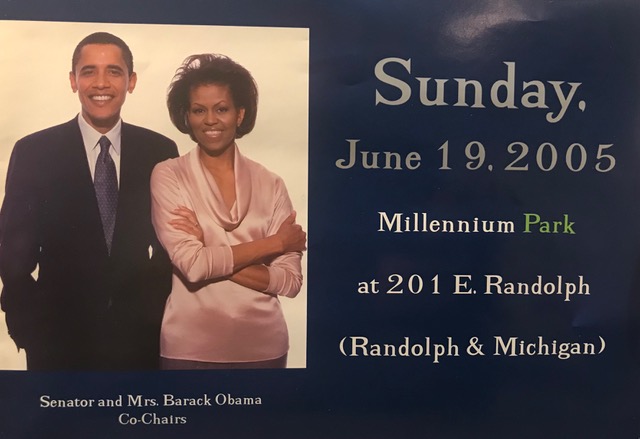
We were approaching the date of the Gala, which was held in Millenium Park in 2005. Ali thought it was time for us to practice his appearance and the particulars of the evening. We rehearsed what I would say in presenting him the lifetime achievement award. He, along with his buddy Cleve, practiced what he would say. We practiced daily for three days. We worked out all of the details: his arrival time, holding area, seating, backstage activity, departure, etc.
Cleve was at his side to make sure all went well. Barack and Michelle Obama were the Gala chairs. I told him I wanted him to meet the couple. Gladys Knight was the entertainment for the evening, and Ali wanted to see her. I told him Rev. Jesse Jackson would be there, and he wanted to see his friend again. We were letter-perfect. Mrs. Ali called to check to make sure all was well. She was pleased and signed off on everything.
Ali told me, “you forgot something—the scholarships to the students; when do you present them?” We had a scholarship in his name arranged by Troy Ratcliff. He wanted to present his award.
Ali told me he wanted another accolade in his name and gave me the assignment to find a real bad boy from the worse part of town, a bad Black boy. Tell him Ali is going to send him to school. He said, “find somebody who doesn’t have a chance.” Would you please bring them to me? I did, and the tears flowed because he spoke to the boys and said, go to school. “You have the Ali Scholarship, and you must live up to my name. I am the greatest, and you have to carry it on.” The tears flowed beyond words. He presented four scholarships. I found another student who was also a boxer who won championships and had recently had won a national title. After the gala night, one day, he came by the office and brought his championship belt. He asked if I would make sure that Ali knew he won. He promised he would stay in school.
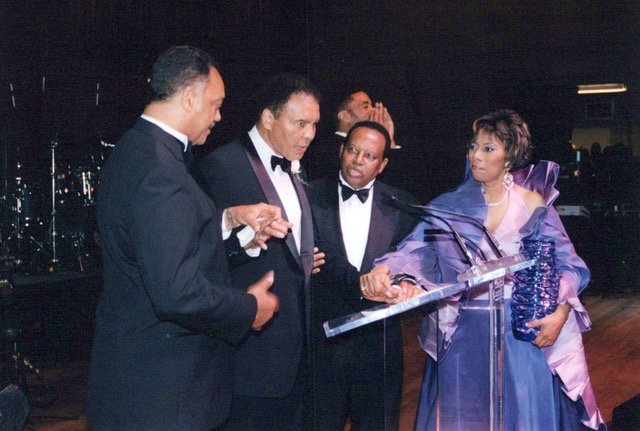
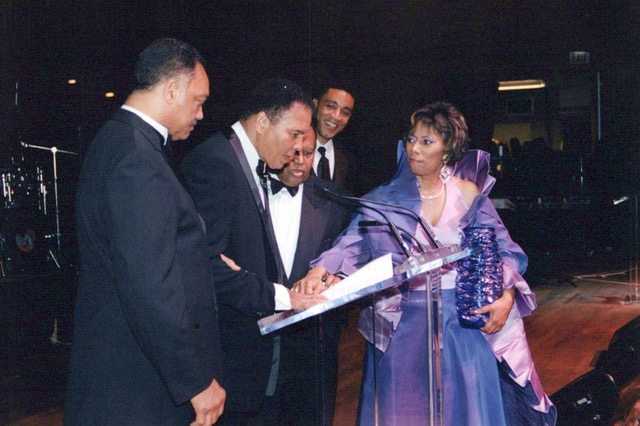
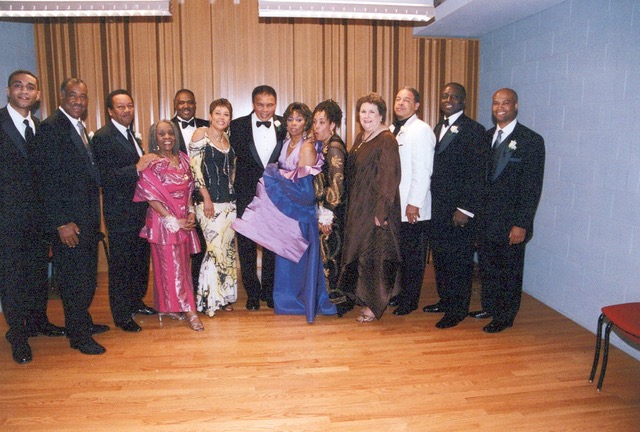
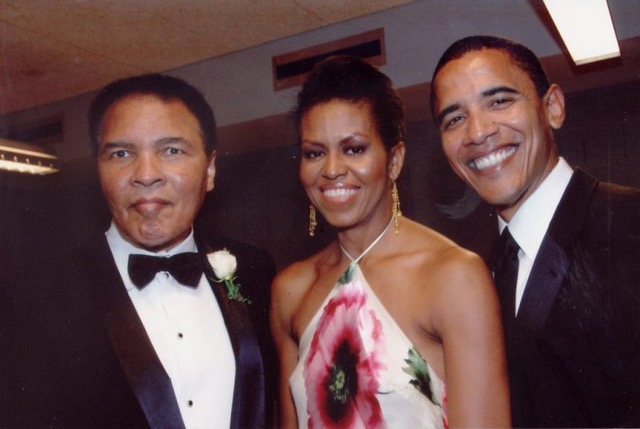
The Gala night was history in the making. It was a perfect beautiful Chicago evening on June 19, 2005, and the park was packed. Cameras were everywhere. The worldwide press attended. Ali met Barak and Michelle Obama for the first time. He visited with Gladys. They all took pictures, with Ali boxing them. He congratulated all of the honorees and of course took pictures with them. He took photos with all of the staff, particularly the pretty women. He told the ladies they were pretty, but not as pretty as he.
And then it was time for the award presentation. We had rehearsed to perfection. Ali and Cleve would come from backstage at the right time. When Ali stepped on stage, the crowd went wild, and the chant was “Ali Ali Ali Ali,” and then the chant turned into “Champ, Champ, Champ!” There were thousands of cameras flashing, people standing and people crying. Ali stopped and just smiled, but he was startled. Rev. Jackson came to the stage with Ali, and we all got lost in a precious moment. Jesse raised Ali’s arm like he was in the ring, and we were thrown off our perfectly timed course. Ali could not hold his arm up. That was not the thing to do. I was pulling Jesse back and watching Ali and got caught between two giants with arms up, hoping they didn’t knock me down. Cleve was the only one on course. Ali loved it and walked to the microphone with “thank you.” He said, “I am the greatest.”
Ali kissed me and I simply lost it. I broke down and just cried. If you were there, you might recall a wonderful evening for the champ. I am so glad that I persisted with this presentation.
At the end of his life, he lived up to his name. He was magnificent and left a rich legacy. He said after the ring and with the inception of Parkinson’s, “Service to others on earth is the rent you pay for your room here on earth.” He knew who he was and also knew what he represented. He challenged Black men to be men. He was the people’s champ.
The award that evening in 2005 was presented to a Champion of Men. I am glad to have found a way for him to be honored in Chicago.


